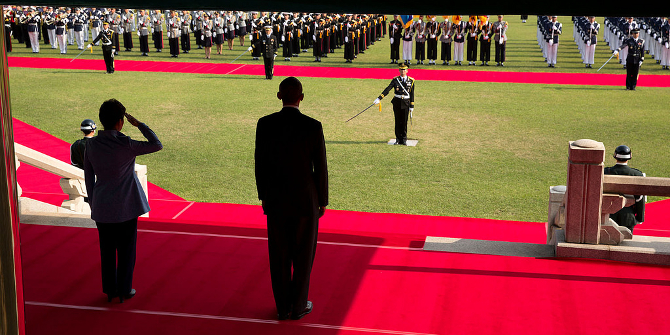 Yesterday, Donald Trump followed his victory in the ‘Acela Primary’ with a major speech on foreign policy. LSE US Centre Director Peter Trubowitz writes that while there was much in the speech to criticise, it was not intended to reassure observers of US foreign policy or America’s allies. He writes that the real audience for the speech was independent American voters who may have lost confidence in Washington, voters that he will need if he is to beat Hillary Clinton in the fall.
Yesterday, Donald Trump followed his victory in the ‘Acela Primary’ with a major speech on foreign policy. LSE US Centre Director Peter Trubowitz writes that while there was much in the speech to criticise, it was not intended to reassure observers of US foreign policy or America’s allies. He writes that the real audience for the speech was independent American voters who may have lost confidence in Washington, voters that he will need if he is to beat Hillary Clinton in the fall.
Donald Trump came out of Tuesday’s ‘Acela Primary’ with victories in all five primary states: Delaware, Maryland, Pennsylvania, Rhode Island and Connecticut. Trump followed up his big wins with a big foreign policy speech yesterday, a speech that was short on specifics and full of inconsistencies and so at that level, there was much to criticise. Many foreign policy experts have already done so and many more will in the coming days. Trump’s speech also will do little to reassure anxious allies around the world. They are genuinely worried about what this year’s presidential election might mean for US foreign policy going forward. Trump’s America First rhetoric conjures up all the wrong associations and images for them.
However, Trump’s speech was not principally designed to reassure US foreign policy wonks or America’s allies overseas. The real target audience was independent American voters — voters that Trump will need to beat Hillary Clinton in the fall and who have been put off by some of his proposals. Indeed, from a political standpoint it’s what Trump didn’t say yesterday that is as important as what he did say. There was no mention of the wall to keep Mexicans out. There was no mention of banning Muslims from entering the US. And there was no mention of encouraging Japan, South Korea, and others to get nuclear weapons. Those positions will not resonate with independent voters and Trump’s speech was designed in part to pivot away from his earlier controversial positions on immigration and nuclear weapons.
To be sure, Trump continued to hammer away at China for its trade practices, America’s allies for not doing enough on defense, and President Obama and Hillary Clinton, his former Secretary of State (who is likely to be the Democrat’s presidential candidate), for fecklessness on foreign policy. These positions will not hurt Trump in the fall campaign — assuming he secures the Republican nomination. Indeed, they will help him reach out to many Americans who have lost confidence in Washington and think the country is on the wrong track internationally as well as domestically.
In short, the speech should be seen less as an attempt to placate foreign policy wonks or foreign capitals than as an effort by Trump to position himself for the general election; to try to set up Clinton as the Washington Establishment’s candidate and himself as the candidate of change.
Featured image America First rally, 1940. Credit: By The original uploader was Jerry Jones at English Wikipedia (Transferred from en.wikipedia to Commons.) [Copyrighted free use], via Wikimedia Commons.
Please read our comments policy before commenting.
Note: This article gives the views of the author, and not the position of USAPP – American Politics and Policy, nor the London School of Economics.
Shortened URL for this post: http://bit.ly/1SvqrcU
_________________________________
 Peter Trubowitz – LSE US Centre
Peter Trubowitz – LSE US Centre
Peter Trubowitz is Professor of International Relations, and Director of the LSE’s US Centre. His main research interests are in the fields of international security and comparative foreign policy, with special focus on American grand strategy and foreign policy. He also writes and comments frequently on U.S. party politics and elections and how they shape and are shaped by America’s changing place in the world.






